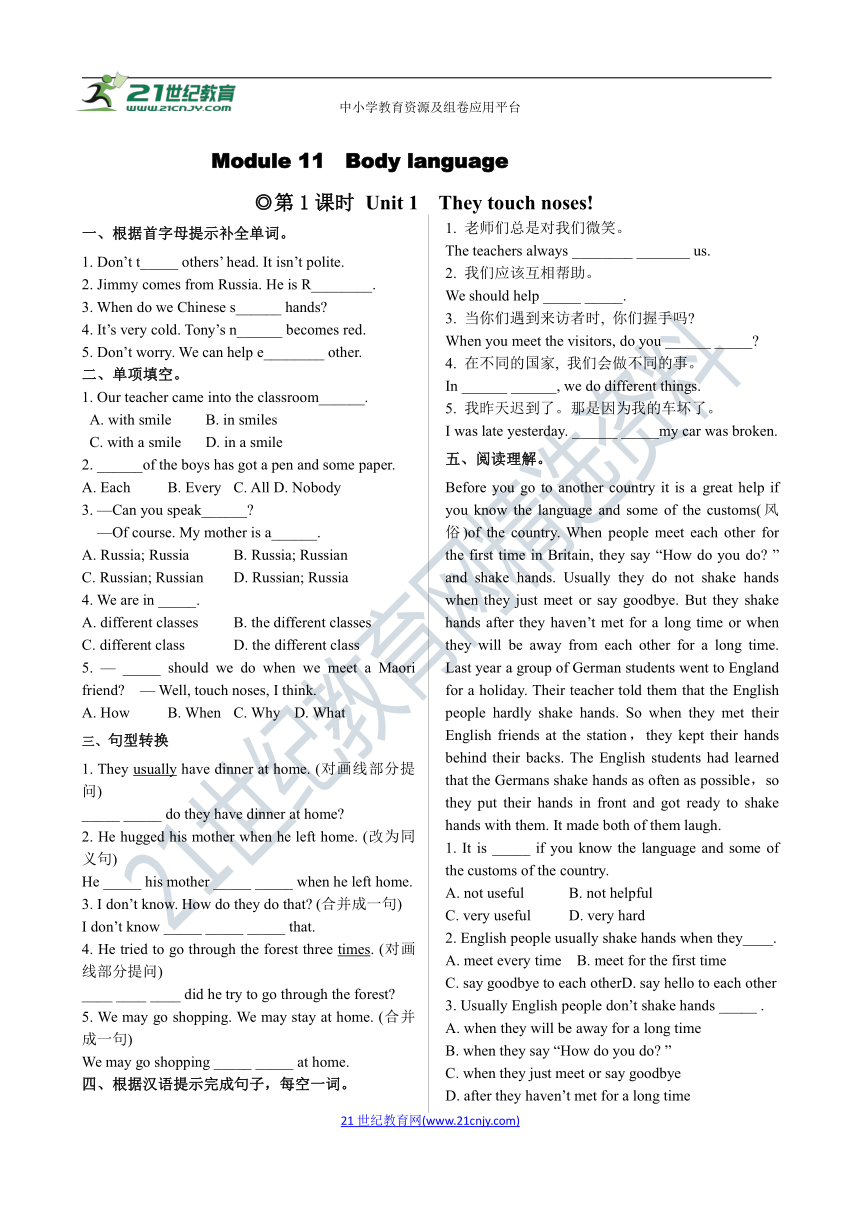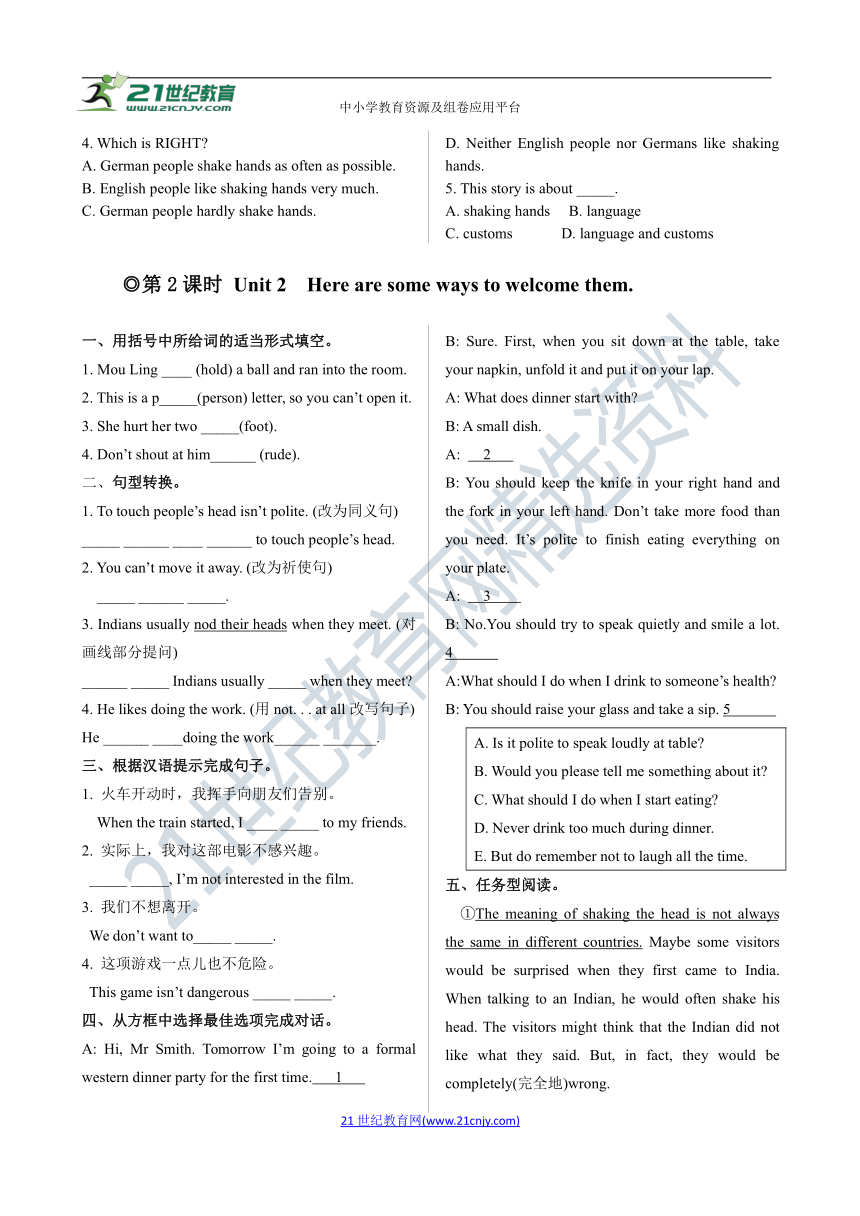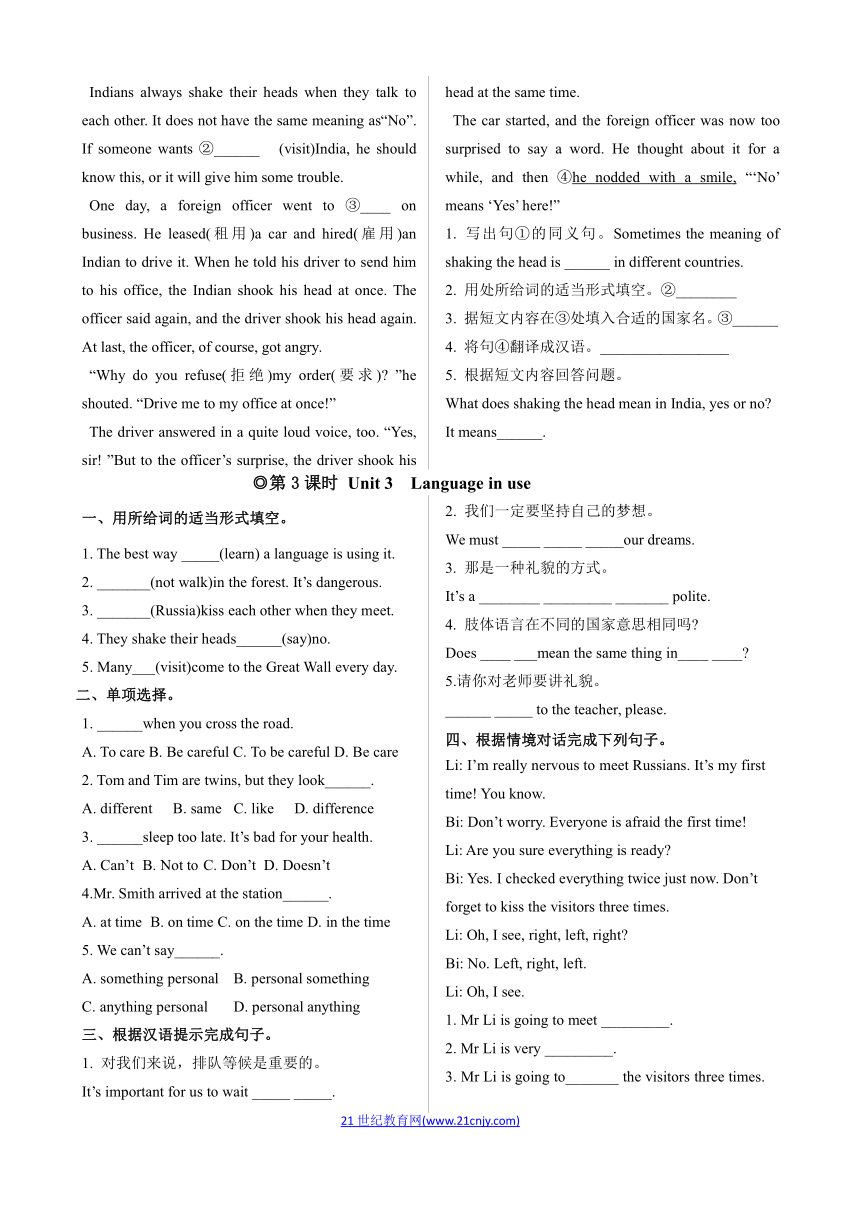Module 11 Body language 分课时练习(含答案)
文档属性
| 名称 | Module 11 Body language 分课时练习(含答案) |  | |
| 格式 | zip | ||
| 文件大小 | 1.2MB | ||
| 资源类型 | 试卷 | ||
| 版本资源 | 外研版 | ||
| 科目 | 英语 | ||
| 更新时间 | 2019-06-11 06:58:43 | ||
图片预览



文档简介
中小学教育资源及组卷应用平台
Module 11 Body language
◎第1课时 Unit 1 They touch noses!
一、根据首字母提示补全单词。
1. Don’t t_____ others’ head. It isn’t polite.
2. Jimmy comes from Russia. He is R________.
3. When do we Chinese s______ hands?
4. It’s very cold. Tony’s n______ becomes red.
5. Don’t worry. We can help e________ other.
二、单项填空。
1. Our teacher came into the classroom______.
A. with smile B. in smiles
C. with a smile D. in a smile
2. ______of the boys has got a pen and some paper.
A. Each B. Every C. All D. Nobody
3. —Can you speak______?
—Of course. My mother is a______.
A. Russia; Russia B. Russia; Russian
C. Russian; Russian D. Russian; Russia
4. We are in _____.
A. different classes B. the different classes
C. different class D. the different class
5. — _____ should we do when we meet a Maori friend? — Well, touch noses, I think.
A. How B. When C. Why D. What
三、句型转换
1. They usually have dinner at home. (对画线部分提问)
_____ _____ do they have dinner at home?
2. He hugged his mother when he left home. (改为同义句)
He _____ his mother _____ _____ when he left home.
3. I don’t know. How do they do that? (合并成一句)
I don’t know _____ _____ _____ that.
4. He tried to go through the forest three times. (对画线部分提问)
____ ____ ____ did he try to go through the forest?
5. We may go shopping. We may stay at home. (合并成一句)
We may go shopping _____ _____ at home.
四、根据汉语提示完成句子,每空一词。
1. 老师们总是对我们微笑。
The teachers always ________ _______ us.
2. 我们应该互相帮助。
We should help _____ _____.
3. 当你们遇到来访者时, 你们握手吗?
When you meet the visitors, do you ______ _____?
4. 在不同的国家, 我们会做不同的事。
In ______ ______, we do different things.
5. 我昨天迟到了。那是因为我的车坏了。
I was late yesterday. ______ _____my car was broken.
五、阅读理解。
Before you go to another country it is a great help if you know the language and some of the customs(风俗)of the country. When people meet each other for the first time in Britain, they say “How do you do? ” and shake hands. Usually they do not shake hands when they just meet or say goodbye. But they shake hands after they haven’t met for a long time or when they will be away from each other for a long time. Last year a group of German students went to England for a holiday. Their teacher told them that the English people hardly shake hands. So when they met their English friends at the station,they kept their hands behind their backs. The English students had learned that the Germans shake hands as often as possible,so they put their hands in front and got ready to shake hands with them. It made both of them laugh.
1. It is _____ if you know the language and some of the customs of the country.
A. not useful B. not helpful
C. very useful D. very hard
2. English people usually shake hands when they____.
A. meet every time B. meet for the first time
C. say goodbye to each otherD. say hello to each other
3. Usually English people don’t shake hands _____ .
A. when they will be away for a long time
B. when they say “How do you do? ”
C. when they just meet or say goodbye
D. after they haven’t met for a long time
4. Which is RIGHT?
A. German people shake hands as often as possible.
B. English people like shaking hands very much.
C. German people hardly shake hands.
D. Neither English people nor Germans like shaking hands.
5. This story is about _____.
A. shaking hands B. language
C. customs D. language and customs
◎第2课时 Unit 2 Here are some ways to welcome them.
一、用括号中所给词的适当形式填空。
1. Mou Ling ____ (hold) a ball and ran into the room.
2. This is a p_____(person) letter, so you can’t open it.
3. She hurt her two _____(foot).
4. Don’t shout at him______ (rude).
二、句型转换。
1. To touch people’s head isn’t polite. (改为同义句)
_____ ______ ____ ______ to touch people’s head.
2. You can’t move it away. (改为祈使句)
_____ ______ _____.
3. Indians usually nod their heads when they meet. (对画线部分提问)
______ _____ Indians usually _____ when they meet?
4. He likes doing the work. (用not. . . at all改写句子)
He ______ ____doing the work______ _______.
三、根据汉语提示完成句子。
1. 火车开动时,我挥手向朋友们告别。
When the train started, I ____ _____ to my friends.
2. 实际上,我对这部电影不感兴趣。
_____ _____, I’m not interested in the film.
3. 我们不想离开。
We don’t want to_____ _____.
4. 这项游戏一点儿也不危险。
This game isn’t dangerous _____ _____.
四、从方框中选择最佳选项完成对话。
A: Hi, Mr Smith. Tomorrow I’m going to a formal western dinner party for the first time. 1
B: Sure. First, when you sit down at the table, take your napkin, unfold it and put it on your lap.
A: What does dinner start with?
B: A small dish.
A: 2
B: You should keep the knife in your right hand and the fork in your left hand. Don’t take more food than you need. It’s polite to finish eating everything on your plate.
A: 3
B: No.You should try to speak quietly and smile a lot. 4
A:What should I do when I drink to someone’s health?
B: You should raise your glass and take a sip. 5
A. Is it polite to speak loudly at table?B. Would you please tell me something about it? C. What should I do when I start eating? D. Never drink too much during dinner. E. But do remember not to laugh all the time.
五、任务型阅读。
①The meaning of shaking the head is not always the same in different countries. Maybe some visitors would be surprised when they first came to India. When talking to an Indian, he would often shake his head. The visitors might think that the Indian did not like what they said. But, in fact, they would be completely(完全地)wrong.
Indians always shake their heads when they talk to each other. It does not have the same meaning as“No”. If someone wants ②______ (visit)India, he should know this, or it will give him some trouble.
One day, a foreign officer went to ③____ on business. He leased(租用)a car and hired(雇用)an Indian to drive it. When he told his driver to send him to his office, the Indian shook his head at once. The officer said again, and the driver shook his head again. At last, the officer, of course, got angry.
“Why do you refuse(拒绝)my order(要求)? ”he shouted. “Drive me to my office at once!”
The driver answered in a quite loud voice, too. “Yes, sir! ”But to the officer’s surprise, the driver shook his head at the same time.
The car started, and the foreign officer was now too surprised to say a word. He thought about it for a while, and then ④he nodded with a smile, “‘No’ means ‘Yes’ here!”
1. 写出句①的同义句。Sometimes the meaning of shaking the head is ______ in different countries.
2. 用处所给词的适当形式填空。②________
3. 据短文内容在③处填入合适的国家名。③______
4. 将句④翻译成汉语。_________________
5. 根据短文内容回答问题。
What does shaking the head mean in India, yes or no?
It means______.
◎第3课时 Unit 3 Language in use
一、用所给词的适当形式填空。
1. The best way _____(learn) a language is using it.
2. _______(not walk)in the forest. It’s dangerous.
3. _______(Russia)kiss each other when they meet.
4. They shake their heads______(say)no.
5. Many___(visit)come to the Great Wall every day.
二、单项选择。
1. ______when you cross the road.
A. To care B. Be careful C. To be careful D. Be care
2. Tom and Tim are twins, but they look______.
A. different B. same C. like D. difference
3. ______sleep too late. It’s bad for your health.
A. Can’t B. Not to C. Don’t D. Doesn’t
4.Mr. Smith arrived at the station______.
A. at time B. on time C. on the time D. in the time
5. We can’t say______.
A. something personal B. personal something
C. anything personal D. personal anything
三、根据汉语提示完成句子。
1. 对我们来说,排队等候是重要的。
It’s important for us to wait _____ _____.
2. 我们一定要坚持自己的梦想。
We must _____ _____ _____our dreams.
3. 那是一种礼貌的方式。
It’s a ________ _________ _______ polite.
4. 肢体语言在不同的国家意思相同吗?
Does ____ ___mean the same thing in____ ____?
5.请你对老师要讲礼貌。
______ _____ to the teacher, please.
四、根据情境对话完成下列句子。
Li: I’m reall (?http:?/??/?www.21cnjy.com?)y nervous to meet Russians. It’s my first time! You know.
Bi: Don’t worry. Everyone is afraid the first time!
Li: Are you sure everything is ready?
Bi: Yes. I c (?http:?/??/?www.21cnjy.com?)hecked everything twice just now. Don’t
forget to kiss the visitors three times.
Li: Oh, I see, right, left, right?
Bi: No. Left, right, left.
Li: Oh, I see.
1. Mr Li is going to meet _________.
2. Mr Li is very _________.
3. Mr Li is going (?http:?/??/?www.21cnjy.com?) to_______ the visitors three times. 4. Mr Bi checked everything _______
五.阅读理解。
Everybody knows that words can carry messages. People communicate(交流) with words. Books, magazines, TVs, radios and films all help us to communicate with others. They all help us to know what is going on in the world and what other people are thinking about.
Do you think you can communicate without words? A smile on your face shows you are happy or friendly. Tears in your eyes tell others that you are sad. When you put up your hand in class, the teacher knows you want to say something or ask a question. You shake your head, and people know you are saying “No”. You nod and people know you are saying “Yes”.
Other things can also carry messages. For example, a sign at the bus stop helps you to know which bus to take. A sign on the wall of your school helps you to find the library.
Signs on doors tell you where to go in or out. Have you ever noticed that there are a lot of signs around you and that you receive messages from them all the time?
People can communicate in many ways without words. For example, an artist can use his drawings to tell about beautiful mountains, the sea and many other things.
根据短文内容,判断正(T)误(F)。
1. People can’t communicate without words.
2. You wave your hand, and people know you are saying “No”.
3. A sign at the bus stop can tell you which bus to take.
4. Signs on the wall can tell you where to go in or out.
5. An artist can use his drawings to tell about many things.
Module 11
Unit 1
一、1. touch 2.Russian 3. shank 4. nose 5. each
二、1. French2. hands 3. visitors4. German5. touch
三、1—5 CACAD
四、1. How often 2. gave; a hug 3. how they do 4. How many times 5. or stay
五、1. smile at 2. each other 3. shake hands 4. different countries 5. That’s because
六、【文章大意】在你去其他国家之前,要了解这个国家的风俗。本文介绍了一个关于英国握手习俗的趣事。
1. 【答案】C【解答】由第一句话可知,如果你了解一个国家的语言和风俗是很有用的。故选C。
2. 【答案】B【解答】由第二句话可知,英国人第一次见面的时候通常握手。故选B。
3. 【答案】C【解答】由第三句话可知,英国人在只是见面或再见的时候,通常不握手。故选C。
4. 【答案】A【解答】由倒数第二句话可知,德国人尽可能经常地握手。故选A。
5. 【答案】C【解答】通读整篇短文可知,本文是关于风俗的。故选C。
Unit 2
一、1. visitors 2. pol (?http:?/??/?www.21cnjy.com?)itely 3. foreigners 4. Don’t wave5. anything
二、1~3. CAB DC
三、1. It is not polite 2. Don’t move away3. What do; do
4. doesn’t like; at all 5. How does; go
四、1.waved goodbye 2. In fact 3.move away 4. at all 5.look at each other
五、1. 【答案】B【解答】 由答语“Sure.”可知,本空答案是个一般疑问句;由向对方介绍一些餐桌礼仪可知,答案选B,“请你告诉我关于它的一些事情好吗?”。
2.【答案】C 【解答】答语主要说了一些吃饭时注意的问题,
所以答案选F,“我开始吃饭时应该怎么做?”。
3.【答案】A 【解答】由答语No.及后边的建议“You should
try to speak quietly and smile a lot.”可知,答案选A,“吃饭
时大声讲话礼貌吗?”。
4.【答案】E 【解答】由上下文可知,此处是对餐桌礼仪的
进一步补充,所以选E,“但一定要记住不要一直大笑”。
5.【答案】D【解答】 由“You should raise your glass and take a sip.”可知,答案选D,“吃饭期间千万不要喝太多”
六、【文章大意】“摇头”在不同的国家意思不总是一样的。本文介绍了在印度“摇头”代表的意义。
1. different2. to visit3. India 4. 他微笑着点头。5. yes
Unit 3
一、1. to learn2. Don’t walk3. Russians4. to say 5. visitors
二、1~5. BACBC
三、1. in line 2. hold on to 3. way of being
4. body language; different countries 5.Be polite (?http:?/??/?www.21cnjy.com?)
四、1. Russians 2. nervous 3. kiss 4. two times
五、【文章大意】人们通常通过语言交流。本文介绍了一些其他的交流方式。
1.【答案】F【解答】由第五段第一句可知,没有语言, 人们也可以用很多其他的方式交流。
2.【答案】F【解答】由第二段第五句可知,你摇头,人们会知道你在说 “不”,而不是挥手。
3. 【答案】T【解答】由第三段第二句可知,公交车站的标志可以告诉你乘坐哪班车。
4. 【答案】F【解答】由第四段第一句可知,是门上的标志而不是墙上的标志会告诉你在哪儿进出。
5. 【答案】T【解答】由第五段第二句可知,画家可以通过画讲述很多事情。
HYPERLINK "http://21世纪教育网(www.21cnjy.com)
" 21世纪教育网(www.21cnjy.com)
同课章节目录
- Module 1 Lost and found
- Unit 1 Whose bag is this?
- Unit 2 Are they yours?
- Unit 3 Language in use
- Module 2 What can you do ?
- Unit 1 I can play the piano
- Unit 2 I can run really fast
- Unit 3 Language in use
- Module 3 Making plans
- Unit 1 What are you going to do at the weekends?
- Unit 2 We're going to cheer the players.
- Unit 3 Language in use
- Module 4 Life in the future
- Unit 1 Everyone will study at home
- Unit 2 Every family will have a small plane.
- Unit 3 Language in use
- Module 5 Shopping
- Unit 1 What can I do for you?
- Unit 2 You can buy everything on the Internet
- Unit 3 Language in use
- Module 6 Around town
- Unit 1 Could you tell me how to get to the Nationa
- Unit 2 The London Eye is on your right.
- Unit 3 Language in use
- Revision module A
- Module 7 My past life
- Unit 1 I was born in a small village.
- Unit 2 I was born in Quincy.
- Unit 3 Language in use
- Module 8 Story time
- Unit 1 Once upon a time….
- Unit 2 Goldilocks hurried out of the house.
- Unit 3 Language in use
- Module 9 Life history
- Unit 1 He left school and began work at the age of
- Unit 2 He decided to be an actor.
- Unit 3 Language in use
- Module 10 A holiday journey
- Unit 1 What did you do?
- Unit 2 This morning we took a walk.
- Unit 3 Language in use
- Module 11 Body language
- Unit 1 They touch noses!
- Unit 2 Here are some ways to welcome them.
- Unit 3 Language in use
- Module 12 Western music
- Unit 1 It's so beautiful!
- Unit 2 Vienna is the centre of European classical
- Unit 3 Language in use
- Revision module B
